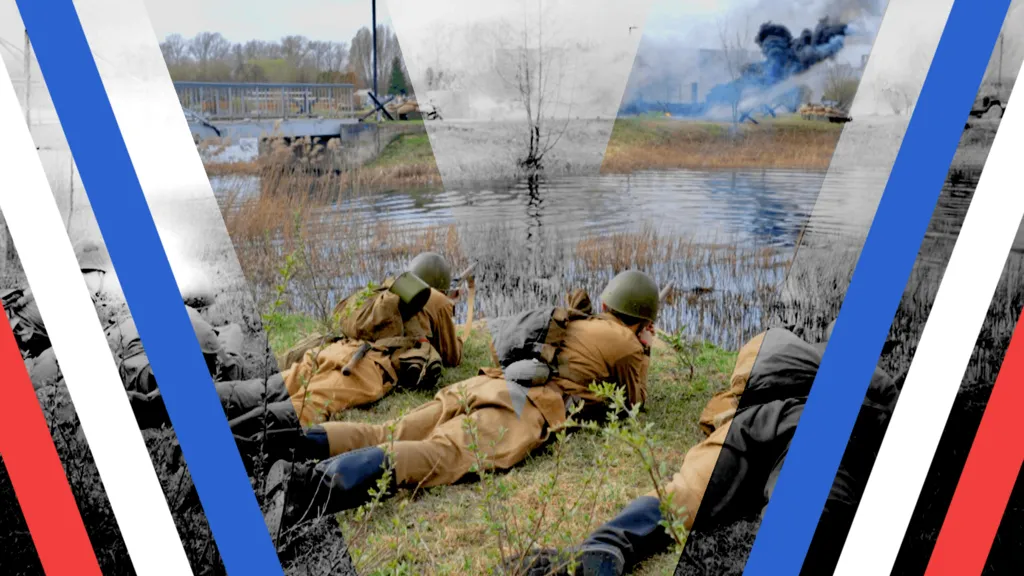
 BBC
BBCEighty miles from Moscow, a park echoes to the sound of explosions and gunfire.
As plumes of thick grey smoke rise into the air, the Red Army storms across a bridge and battles for control of a tiny island. More Soviet soldiers are arriving by boat from across a lake.
Once on the island they tear down a swastika and replace it with the hammer and sickle of the Soviet Union. Victory.
A large crowd is watching from the safety of the shore. What they're witnessing is an historical re-enactment of one of the final battles for Berlin in 1945. It led to the capitulation of Nazi Germany and what Moscow still refers to as The Great Victory.
The battle for Berlin, unfolding in front of me in the town of Dubna, is one of many events in Russia for the 80th anniversary of the Soviet victory in World War Two.
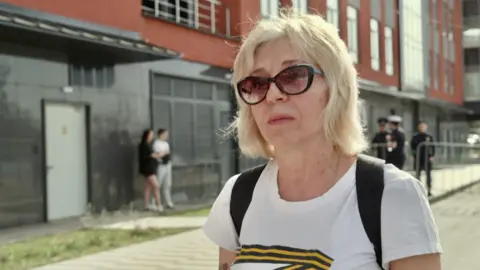
The anniversary is receiving enormous attention in a country where the national idea is built very much around the notion of Russia as victor and victim.
"I'm here because my grandfather fought in this war," one of the spectators, Katya, tells me.
"He went missing near Berlin. Much later we found out he'd been killed in January 1945."
Eighty years on Katya's son is fighting in Ukraine.
"My son is in a war now. He's in the 'special military operation'," she tells me. "He volunteered. I tried to talk him out of it. But he hasn't listened to anyone since he was a kid.
'I'm my own tsar,' he told me. 'Go fight, then, if you're a tsar,' I replied. He and his friend went together. His friend was killed."
Katya's family history is a story of different generations fighting on the front line.
But in very different circumstances.
In 1941, Hitler's Germany invaded the Soviet Union to try to conquer the world's largest country and secure world domination. Soviet soldiers (Katya's grandfather among them) fought to liberate their country from the Nazis. Victory for Moscow came at an enormous human cost: more than 27 million Soviet citizens were killed in what is known here as the Great Fatherland or Great Patriotic War.
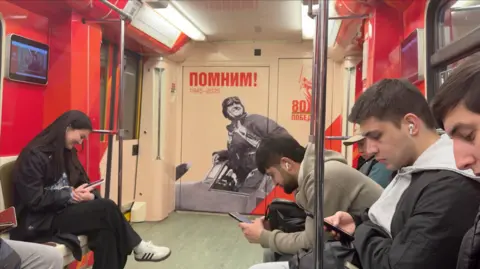
But in 2022 it was Russia that launched a large-scale invasion - of its neighbour. What the Kremlin still calls a "special military operation" was widely seen as an attempt to force Ukraine back into Russia's geo-political orbit. In March 2022, the UN General Assembly overwhelmingly adopted a resolution condemning Russia's "aggression."
And yet the Russian authorities portray the war in Ukraine as a continuation of World War Two. The official narrative here creates a parallel reality, in which Russia once again is fighting Nazism and fascism, in Ukraine and across Europe. Russia, the country which invaded Ukraine, presents itself as the victim of external aggression.
"Historically and sociologically, victory in the Great Patriotic War was always a cornerstone of Russian united consciousness," Novaya Gazeta columnist Andrei Kolesnikov explains, "because there is no glue for the nation: only this event. It was always so, from Brezhnev's time until now.
"But what's happening now is something special. Now the Great Patriotic War is presented as just the first step in our permanent war with the West, against 'Eurofascism.' The Special Military Operation as the continuation of the Great Patriotic War: this is something new."
In Russia, television plays a key role in spreading the official message that Europe couldn't be trusted then and cannot be trusted now. Recently, on Russian TV, I saw a documentary entitled "Europe Against Russia. Hitler's Crusaders". It was about how European countries had collaborated with the Nazis during World War Two.
No mention of the 1939 non-aggression pact between Hitler and Stalin: under its secret protocol Germany and the USSR had carved up spheres of influence in eastern Europe.
Last month a Russian TV presenter launched a tirade against German Chancellor Friedrich Merz, a staunch supporter of military support to Ukraine. The talk show host called Germany's leader "a Nazi scumbag" for comments about Russia. Addressing the Chancellor directly, the anchor said that Russians "hold you and your comrades responsible for the killing of 27 million Soviet citizens."
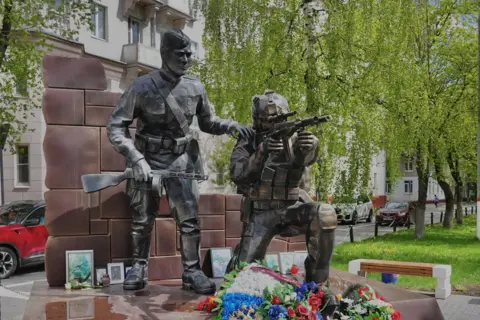
Iconography underpins the ideology. In the town of Khimki, near Moscow, a recently unveiled monument depicts a Red Army soldier side by side with a Russian who is fighting in Ukraine. Framed photos of Russian soldiers killed in Ukraine have been placed below the two fighter figures.
An inscription reads: "By preserving the past we defend the future!"
Wars past and present: brought together in bronze.
In the run up to Victory Day, Russia has been awash with reminders of The Great Victory. Last month a Soyuz rocket decorated to celebrate the 80th anniversary of the defeat of Nazi Germany blasted off from the Baikonur cosmodrome.
Back down on earth, at a maternity hospital in the Siberian city of Kemerovo, newborn babies are being dressed in miniature Red Army caps and capes.
On its Telegram channel, the hospital explained that battle clothes for babies served "as a reminder of links between the generations, the courage of the defenders of the Fatherland and of how even the tiniest Russian citizen is part of a big history."
In Moscow, the Russian word for 'Victory' - 'Pobeda' – is everywhere: on giant billboards, on posters in shop windows, even stuck to the side of road-sweepers. Underground, special "victory trains" on the Moscow Metro have been decked out with World War Two imagery and the words: "Be proud!" and "Remember!"
Tanks have been rolling down Moscow's main street, Tverskaya, at rehearsals for the big 9 May parade on Red Square. In Soviet times, after 1945, military parades on Victory Day were rare. Under Vladimir Putin they have become a key element of what is now Russia's most sacred national holiday - a day not only for remembering the victims of World War Two, but for showcasing Russian military power and to unite the people around the idea of Russia as an unbeatable nation.
The USSR was, indeed, victorious in the Great Patriotic War. But eighty years on, and despite confident pronouncements by Russian officials, victory eludes Moscow in Ukraine. The Kremlin's "special military operation" was only expected to last a few days, a few weeks maximum. After more than three years of war – and huge casualties on both sides - it's still unclear how and when the fighting will end.
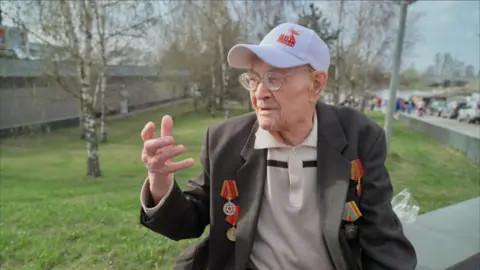
The Kremlin says 29 world leaders, including China's Xi Jinping, will be attending the Victory Day parade. According to Moscow, Serbia's President Aleksandar Vucic and Slovak Prime Minister Robert Fico will be visiting Russia for the commemorations. Ensuring security for the military parade and guests on Red Square will already have been a top priority for the Kremlin. Even more so after two consecutive nights of Ukrainian drone attacks targeting Moscow.
Back in Dubna, German resistance has crumbled and the Red Army is in full control. The re-enactment is over.
Some of the spectators here believe the official portrayal of Russia as a besieged fortress threatened by the West.
"Both Britain and America have betrayed us and threaten us," Lidiya tells me. "But we are resilient. You cannot defeat Russia."
When I talk to 98-year-old Fyodor Melnikov, he doesn't get into politics. The military show has sparked painful memories for him. Fyodor's brother was killed in the Great Patriotic War.
"War is a terrifying thing," Fyodor tells me. "People should be allowed to live freely. Let them work, let them live their lives, let them die naturally."
Fyodor has written a poem about his late brother, about war. He recites it for me. In translation it sounds like this:
"A uniform I never wore,
A battle I never saw.
But in my mind's eye I see
My brother going off to war.
The only thing he said to me
Before he went was this:
'Live, little brother, be well.'
I will bring victory home."
On Friday, along with the whole of Russia, Fyodor Melnikov will be celebrating the 80th anniversary of The Great Victory of 1945.
But it will be a day for remembering, too: friends and family who never returned.
A day for acknowledging the cost of war.
